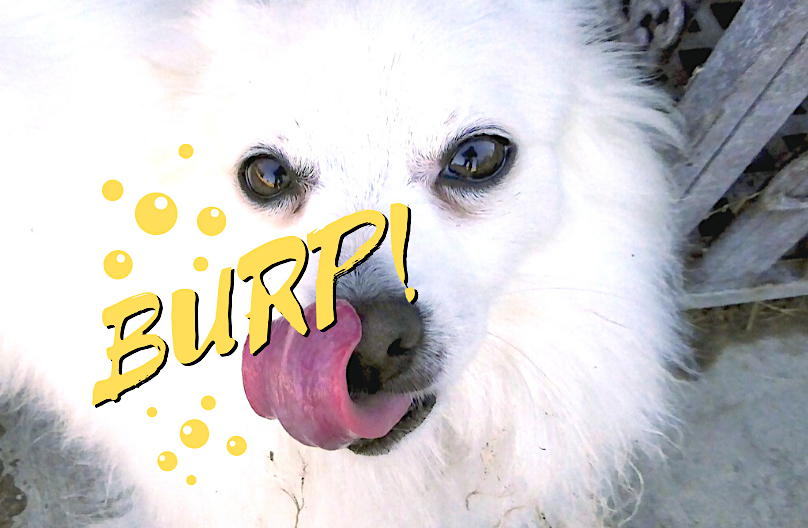
This pet health content was written by a veterinarian, Dr. Pippa Elliott, BVMS, MRCVS. It was last reviewed July 15, 2020.
If you have questions or concerns, call your vet, who is best equipped to ensure the health and well-being of your pet. This article is for informational purposes only and is not a substitute for professional medical advice, diagnosis or treatment. See additional information.

Understanding Why Dogs Burp
Does your dog eructate gas through their esophageal sphincter?
Wait. Huh?
The answer (even if the question made no sense) is yes, because this is exactly what happens when dogs burp. A burp is the passage of air from the stomach, up the gullet, and out of the mouth — sometimes accompanied by a little pop of wind.
Do dogs burp? Yes, they do! Burping, also known as eructation, is common in many mammals, including our canine companions. A burp occurs when air escapes from the stomach and travels through the esophagus and out of the mouth.
- Mammals do it: Learn more about how mammals burp.
- Bloat in dogs: When a dog cannot burp, it can be a sign of a serious condition known as bloat.

Why Do Dogs Burp?
When a dog eats, part of the digestive process involves producing gas, much like a car engine produces exhaust. Do dogs burp to release this gas? Yes, and here’s why:
- Gas Venting: The body needs to expel gas to prevent the dog from inflating like a balloon. This happens through burping or flatulence, both of which are normal in moderation.
Causes of Dog Burping
The amount of gas a dog releases can be influenced by several factors:
- Fermentable Foods:
- Certain foods are notorious for producing gas in the gut, such as eggs, cruciferous vegetables (like cabbage and Brussels sprouts), beans, and cheeses.
- These ingredients are highly fermentable, leading to increased gas production.
- Read about highly fermentable foods.
- Gulping Down Gas:
- Dogs that eat quickly often swallow a lot of air, which can lead to burping.
- This is common in dogs that don’t chew but swallow their food whole.
- Brachycephalic Burps:
When Burping May Signal a Problem
Sometimes, dog burping can indicate an upset stomach, which may be caused by:
- A sudden change in food
- Inflammatory bowel disease
- Germs (bacteria, viruses, parasites)
As a rule of thumb:
- If the dog has a good appetite, normal poop, and seems happy, occasional burping is usually harmless.
- However, if the dog is burping more than usual, seems unwell, or has an upset stomach, it could be a sign of ill health.
Is Burping Bad for Dogs?
No, dog burping is not inherently bad. In fact, a reasonable amount of burping by a dog is entirely normal and even a good thing.
Excessive Burping: Why Does My Dog Burp So Much?
Any change from normal behavior, whether it’s thirst, appetite, or activity, may be a clue that something is wrong. The same applies to an increase in dog burping.
Monitor your dog closely and look for further signs:
- Check their poop: Is there diarrhea?
- Watch for vomiting: Is your dog throwing up?
- Keep an eye on appetite: Is your dog eating less or more than usual?
This information will be crucial if you need to visit the vet.
An Inability to Burp
A more serious concern is when a dog is unable to burp. If the gas can’t escape, the stomach can inflate like a balloon, leading to a potentially life-threatening condition known as bloat.
Signs of bloat in dogs include:
- The dog retches but is unable to bring anything up.
- Restlessness and distress.
- Inability to swallow, leading to excessive drooling.
- A distended or bloated belly.
- Collapse.
Some symptoms can be subtle, so if you have any concerns, call your vet for advice. Bloat requires prompt treatment, and even then, it can have serious consequences.
Was YOUR Pet Food Recalled?
Check Now: Blue Buffalo • Science Diet • Purina • Wellness • 4health • Canine Carry Outs • Friskies • Taste of the Wild • See 200+ more brands…

What causes bloat?
- The physical cause of bloat is the stomach flipping over on itself, sealing off the valves at the entrance and exit.
- This can happen for various reasons, including exercising on a full stomach. To prevent this, always leave at least 1 hour between eating and exercise.
What You Can Do If Your Dog Burps a Lot
While dog burping is not necessarily a problem, excessive burping could indicate that:
- Your dog is eating too quickly.
- The quality of their food isn’t great.
- They are swallowing a lot of air due to breathing difficulties.
A belly full of gas can predispose a dog to bloat, so it’s important to take action if your dog is overly belchy.
How to Help Your Dog Burp Less
If your dog is burping frequently, there are several steps you can take to help reduce it:
- Slow Down Eating: Use slow feeders or puzzle toys to prevent your dog from gulping down food and swallowing excess air.
- Adjust Diet: Consider switching to a diet that is lower in fermentable carbohydrates and higher in easily digestible proteins.
- Avoid Feeding Before Exercise: Ensure your dog’s stomach has time to settle before any vigorous activity to prevent burping.
- Monitor Portions: Feeding smaller, more frequent meals can help reduce the amount of air swallowed during eating.
- Consult a Vet: If your dog continues to burp excessively despite these measures, consult your veterinarian for further advice.
These additions will provide more comprehensive information for your readers while naturally incorporating the focus keyword.

Greedy Eater? Slow Feeders Are the Answer
If your dog tends to eat too quickly, there are plenty of ways to encourage them to slow down during mealtime.
The Benefits of Using Slow Feeders
One effective method is the use of puzzle feeders or slow feeders. These tools require the dog to solve a problem to access the food or make it physically impossible to gulp down the food in one go.
For example, I use a KONG toy for my dog, Pogs. I layer dry kibble and wet food inside the KONG, forcing her to lick away at the wet layer to release the kibble. This simple technique slows her mealtime from just a few seconds to at least 20 seconds.
Other options for slow feeding include:
- Muffin Tin Feeder: Place small amounts of food in each cup depression of a muffin tin. This prevents the dog from gobbling everything up at once.
- DIY Plastic Bottle Feeder: For smaller dogs that eat kibble, use a clean plastic bottle and drill some holes in the side. Smooth the edges to avoid any injuries, then fill the bottle with kibble. The dog must bat the bottle around to get the kibble to fall out.
- Kibble Scattering: Sprinkle kibble in the grass outside and let your dog root around for it.
There are many other slow feeding options available, and it’s not hard to improvise using items you already have around the house.
For more information, you can check out this guide to slow feeders.
Avoid Competition at Mealtimes
Some dogs eat quickly to prevent another pet from getting their food. If this is the case with your dog, consider feeding them in separate rooms. While policing mealtimes in the same room can help, the sight of other dogs can still create pressure to eat quickly in order to protect resources.
Don’t Feed an Out-of-Breath Dog
It’s safest to exercise your dog on an empty stomach. However, feeding a hot and out-of-breath dog immediately after exercise can lead to issues.
- Let your dog catch their breath before a meal.
- A panting dog will likely swallow a lot of air while eating, which can contribute to burping and other digestive issues.
- Waiting a few minutes before feeding can help reduce the amount of air swallowed.
Food Matters
The quality of the food your dog eats plays a significant role in reducing burps and flatulence. To minimize these issues, feed a high-quality dog food that is low in fermentable carbohydrates and proteins.
- Choose food with named meats among the top ingredients, rather than soy, cereal, or cheap meat or fish meal.
If you decide to change your dog’s diet, do so gradually:
- Slow Transition: Take several days to increase the amount of the new food while decreasing the old diet.
This gradual transition allows your dog’s gut bacteria to adjust, helping to prevent digestive issues like diarrhea.
Trivia Questions About Dog Burps and Farts
Amaze and amuse your friends with this gas-related trivia:
- Swallowed air, like what happens when a dog eats too quickly, takes 2 hours to travel the length of the gut and pass out as room-clearing flatus.
- Soybean meal is a cheap protein commonly used to bulk up dog food. However, it’s like rocket fuel for colonic bacteria, which produce lots of noxious-smelling gas that is passed as offensive smelling flatus.
Final Thoughts on Dog Burping
Does your dog burp? Of course they do, and now you know why!
Burping is perfectly normal for dogs, but keep an eye out for other signs of ill health. If your dog’s burping becomes excessive or is accompanied by other symptoms, it’s best to consult your vet.
Frequently Asked Questions (FAQ)
Why do dogs burp?
Dogs burp to release excess gas that accumulates in their stomachs during the digestive process.
Why do dogs burp in your face?
Dogs may burp in your face because they often seek your attention or are simply close to you when they release the gas.
Why do dogs burp a lot?
Dogs may burp a lot due to eating too quickly, swallowing air, or consuming gas-producing foods.
How do dogs burp?
Dogs burp by expelling air that has built up in their stomachs through their mouths, much like humans do.
References
- Downing, Robin, DVM, DAAPM, DACVSMR, CVPP. “Dogs and Gas.” VCA Hospitals. https://vcahospitals.com/know-your-pet/dogs-and-gas.
- Kane, Ed, PhD. “Flatulence in Dogs: Annoyance or Sign of GI Illness?” dvm360. Jan. 1, 2015. https://www.dvm360.com/view/flatulence-dogs-annoyance-or-sign-gi-illness.
- Brooks, Wendy, DVM, DABVP. “Bloat: The Mother of All Emergencies.” Veterinary Partner. Aug. 23, 2019. https://veterinarypartner.vin.com/default.aspx?pid=19239&catId=102899&id=4951541.
- Finch, Graham, BVSc, Cert.VD, MRCVS. “Is It Normal for a Dog to Burp So Much?” Dogs Monthly. Feb. 26, 2019. https://dogsmonthly.co.uk/2019/02/26/is-it-normal-for-a-dog-to-burp-so-much/.
- “Flatulence: Farting and Gas Problems in Dogs.” Vetwest Animal Hospitals. https://www.vetwest.com.au/pet-library/flatulence-farting-and-gas-problems-in-dogs.
- “Do Dogs Burp?” A Pup Above. https://apupabove.com/blogs/all/do-dogs-burp
- “Why Does My Dog Burp So Much?” JustFoodForDogs. https://www.justfoodfordogs.com/blog/why-does-my-dog-burp-so-much.html
- “Dog Burping: What’s Normal and What’s Not?” Great Pet Care. https://www.greatpetcare.com/dog-behavior/dog-burping-whats-normal-and-whats-not/


